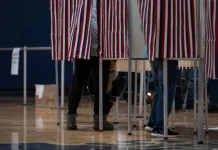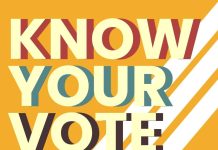Contributing reporters: Justin Fredua-Agyeman, Soob Soobitsky, Kyle Dobrie, Lauren Hall
On Tuesday, Donald Trump won the 2024 election, making him the 47th United States President. The NewEnglander team met with Dr. Nathan Shrader, a Politics Professor at NEC, to discuss the election and gain insight into the near future.
The decision is definite, and the results concluded very quickly, in contradiction to what was expected, Shrader said. Many who are new to this process might be wondering what happens next.
“The Presidential transition comes next, and that’s where the outgoing administration, supposedly, will work with the incoming administration on who will lead key agencies, who will be appointed to key positions,” Shrader said.
This process though, one that is usually mildly predictable for the American people, may look different, like many elements of this election, he said.
“We don’t really know where he’s going to draw from for cabinet secretaries, agency heads, Chief of Staff, and things like that. That’s usually a little more predictable than it is right now. Because so many of those people he had in his cabinet the last time either refused to endorse him or endorse his opponent,” Shrader said.
This election had many unique components.
“You have to go back to 1948 to find a year where the President’s party has changed out the VP before the election,” Shrader said.
Donald Trump’s second presidential inauguration will be held in Washington DC on January 20, 2025.
Because this is his second term, the next election will be an open race, meaning democrats and republicans alike will be looking to begin campaigning “now,” Shrader said.
“It never fails that they’re going to start doing that really soon,” he said.
There will likely be a break from political ads and powerful candidates bashing each other, but the next cycle will begin quietly.
“There’s a phase of the presidential campaign, the thing that happens very early, called the shadow campaign,” Shrader said.
The shadow campaign is a way for potential candidates to make themselves known in the political world by making appearances in certain areas of the country, like New Hampshire. These appearances allow potential candidates to get attention and meet potential supoorters without declaring their campaign. This helps them get around many rules and restrictions on the financial and social aspect of presidential campaigning, Shrader said.
“They’re going to start going to early states and running the shadow campaigns, coming to places like NEC to have just a little talk with people,” Shrader said.
Shrader’s take is that every election and every turn of events is a new opportunity.
“I know half the country are elated right now, and half the country is pissed off” he said. “In American politics, we have a midterm election in two years, another presidential election in four years. Don’t sulk. Learn. Figure out what went wrong, what went right. Learn how to become a better organizer, to prepare now for the next campaign and the role you want to play in it. Do it now. Don’t sit around and feel bad about it. Just plan the next step.”






















